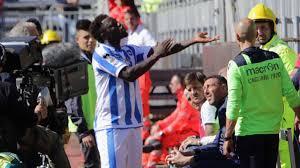By Andrew Warshaw in Manama, Bahrain
May 9 – FIFA’s two top officials waded into the Sulley Muntari racism affair today expressing their solidarity with the player but stopping short of a strong condemnation of the under-fire Italian authorities for their initially insensitive approach.
Following a global outcry, Pescara’s former Ghanaian midfielder had his controversial one-match ban for protesting against racist abuse overturned last Friday by Italy’s football authorities but said he was “treated like a criminal” for complaining.
Muntari was booked against Cagliari after he reported the abuse to the referee, then cautioned again and dismissed after becoming the latest player to walk off the pitch in protest, resulting in a one-game ban.
Last year, FIFA controversially disbanded its anti-discrimination advisory panel saying the body had fulfilled its “specific mandate”, only to find to its cost that racism was very much still prevalent in a number of footballing nations.
Muntari said FIFA was not doing enough to combat racism and FIFA president Gianni Infantino admitted there was still considerable work to be done.
“Of course I will speak to (Italian FA chief Carlo) Tavecchio, I will speak to Muntari as well … we will work together,” Infantino told reporters ahead of the FIFA Council meeting here without actually criticizing the ban on Muntari.
No sooner has Infantino spoken, however, than his number two Fatma Samoura, who is supposed to be FIFA’s in-the-know, hands-on administrator, seemed to take a somewhat confused position.
“I have no message (for Muntari),” said Samoura, a former United Nations official who at times doesn’t appear to fully comprehend her new brief running FIFA’s day-to-day activities.
“I don’t have to call people every time they are victims of abuse,” said the multi-lingual Senegalese. “We have committees in charge of disciplinary action … and we need to let them do their work. We’ve been very severe in Europe and Latin America.”
Tellingly, Samoura did not say what potential sanctions might be imposed by FIFA whilst defending the decision to abandon its anti-racism Task Force, saying it had run its course after three years. Its recommendations included more observers at games and tougher penalties for clubs whose players, officials or fans are guilty of racism.
“They made their recommendations and we went beyond that,” Samoura insisted.
“It’s not my call to condemn the Italian FA. We have a zero tolerance policy but should I speak to every person in the football world who is a victim of racism? I mean, let’s be serious. I have my personal feelings but I’m here to make sure FIFA takes the appropriate action through its disciplinary committees and the sooner the better.”
Contact the writer of this story at moc.l1714182368labto1714182368ofdlr1714182368owedi1714182368sni@w1714182368ahsra1714182368w.wer1714182368dna1714182368

